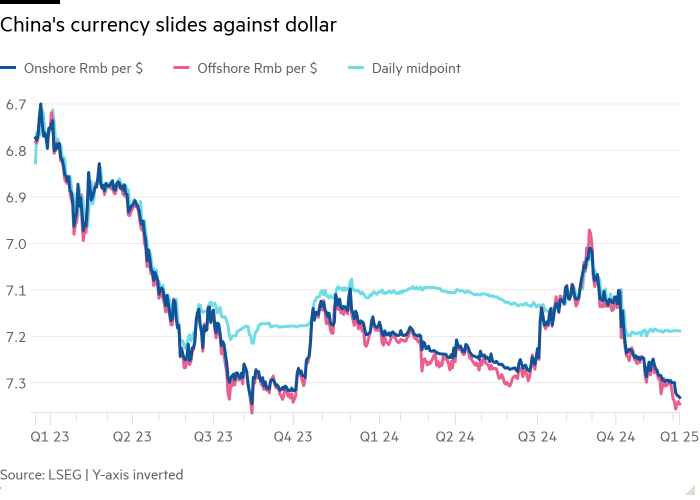The Chinese currency fell to a 16-month low after strong US economic data overnight, and with the incoming Trump administration more likely to impose sharp tariff hikes, raising concerns about the growth prospects of the world’s second-largest economy.
The local renminbi fell 0.1 percent to RMB7.34 per dollar on Wednesday, its weakest level since September 2023, despite the People’s Bank of China maintaining a steady stabilization rate ahead of Donald Trump’s inauguration this month.
The Chinese currency is allowed to trade within 2 percent of the daily rate set by the central bank, and the exchange rate is close to the lower end of this trading range.
The selling pressure partly reflects concerns that steep tariffs on Chinese products proposed by Trump would force the People’s Bank of China to weaken the renminbi to offset their impact on exports, which has helped the country maintain economic growth amid weak domestic consumer demand.
Strong US jobs and services data on Tuesday also reinforced expectations that the Federal Reserve will cut interest rates more slowly than previously expected, in contrast to China, which is easing monetary policy to fight deflationary pressures.
“The market is impatient and wants an explosion in the value of the renminbi,” said Wei Khun Zhong, chief market strategist at the Bank of New York.

The People’s Bank of China announced its intention to maintain the “fundamental stability” of the renminbi and not allow the exchange rate to “overshoot” the markets.
Beijing, grappling with increasing deflationary pressures in the economy caused by declining household and investor confidence, has gradually turned towards more stimulus measures to boost growth. On Wednesday, it expanded a program to support consumers who trade in old appliances such as air conditioners and washing machines.
But many economists believe she is delaying announcing more spending plans while she waits for Trump’s inauguration on January 20 to get more clarity on potential tariffs. The president-elect said he would impose tariffs of up to 60 percent on China.
The People’s Bank of China (PBoC) on Wednesday announced a daily fixing rate of RMB7.1887 to the dollar, almost unchanged from Tuesday’s fixing rate of RMB7.1879. But pressures on the exchange rate mounted after strong US economic data sent the dollar higher on Tuesday.
The selling pressure on the renminbi is “essentially a reflection of the Trump trade,” said Joe Wang, head of foreign exchange and interest rates strategy at BNP Paribas. “The market has been doing this since the US elections… We feel a lot has been priced in, but the market doesn’t want to give up.
The People’s Bank of China appears to be in a “wait-and-see mode,” Wang said.
Analysts said the central bank wants to maintain a stable exchange rate while it waits for more clarity on Trump’s trade policies, adding that any slight easing of the reform could risk a bigger sell-off in the Chinese currency.
In Hong Kong, offshore renminbi financing costs have risen in recent days in a sign that the People’s Bank of China is trying to defend the exchange rate against speculators.
While onshore renminbi cannot be traded outside the 2 percent band set by the People’s Bank of China, there is no such restriction for offshore renminbi.
Chinese stocks also fell on Wednesday, with mainland China’s CSI 300 index falling 0.2 percent and Hong Kong’s Hang Seng falling 0.9 percent.
https://www.ft.com/__origami/service/image/v2/images/raw/https%3A%2F%2Fd1e00ek4ebabms.cloudfront.net%2Fproduction%2F600a9a3e-cafa-41fb-9b55-82e096eef56f.jpg?source=next-article&fit=scale-down&quality=highest&width=700&dpr=1
2025-01-08 07:53:00
#Chinas #currency #hits #16month #Trump #tariff #fears

